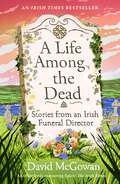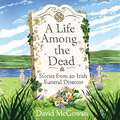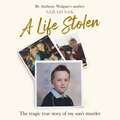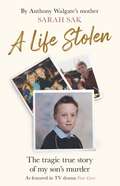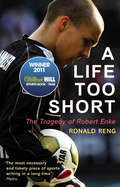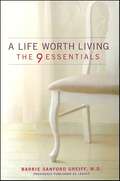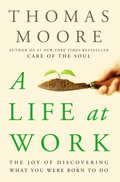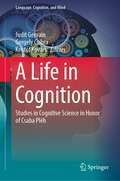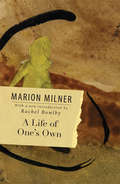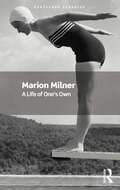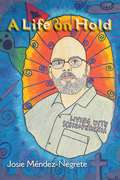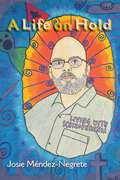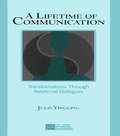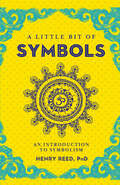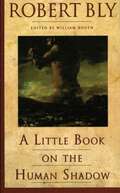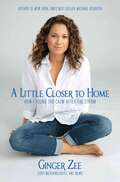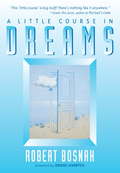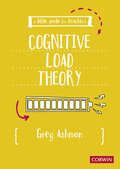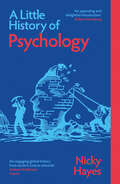- Table View
- List View
A Life Among the Dead: Stories from an Irish Funeral Director
by David McGowanWhen death is a way of life . . .In A Life Among the Dead, David McGowan, Ireland's best known Funeral Director, and subject of the Award-winning Netflix documentary The Funeral Director, guides us through the business, the science and the unexplained elements of death.Alongside exploring the unique approach of Irish culture when it comes to grief and death, David seeks to demystify the process of dying and what happens to the body afterward.The only certainty when we come into this life is that we are going to leave it, and yet it's something most people are reluctant to discuss or allow themselves to think about. David's mission is to open up conversations and encourage people to have an understanding of their loved ones wishes as well as their own.Poignant, humorous and educational, this is an account of a life lived with purpose in the service of the dead.
A Life Among the Dead: Stories from an Irish Funeral Director
by David McGowanWhen death is a way of life . . .In A Life Among the Dead, David McGowan, Ireland's best known Funeral Director, and subject of the Award-winning Netflix documentary The Funeral Director, guides us through the business, the science and the unexplained elements of death.Alongside exploring the unique approach of Irish culture when it comes to grief and death, David seeks to demystify the process of dying and what happens to the body afterward.The only certainty when we come into this life is that we are going to leave it, and yet it's something most people are reluctant to discuss or allow themselves to think about. David's mission is to open up conversations and encourage people to have an understanding of their loved ones wishes as well as their own.Poignant, humorous and educational, this is an account of a life lived with purpose in the service of the dead.
A Life Stolen: The Tragic True Story of My Son's Murder
by Sarah SakAs featured in the BBC drama Four Lives. <p>On 18 June 2014 Sarah Sak's son, Anthony Walgate, was murdered by serial killer Stephen Port after they met on dating app Grindr. Two years later Stephen Port was sentenced to life imprisonment at the Old Bailey in November 2016. <p><p>The case received extensive press coverage not only because of the horrific nature of the crimes but also because the police refused to investigate Anthony's death despite three more bodies being found in near identical circumstances. It was not until Scotland Yard's crime squad took over that Stephen Port was arrested, charged, convicted and sentenced to life in prison. <p><p>Sarah Sak's courage and perseverance helped to achieve justice for her much-loved son and now she campaigns for better policing, to recognise and link crimes, support families, counter homophobia and raise greater public awareness of the dangers of dating sites/apps, to prevent further deaths. <p><p>In A Life Stolen Sarah will tell the story of the murder of her son in full for the first time in an attempt to understand how this happened and what might have been done to prevent it.
A Life Stolen: The inspiration behind the new TV drama Four Lives
by Sarah SakSarah Sak's son, Anthony Walgate, was murdered by gay serial killer Stephen Port after they met on dating app Grindr. Stephen Port was sentenced to life imprisonment at the Old Bailey in November 2016. The case received extensive press coverage not only because of the horrific nature of the crimes but also because the police refused to investigate Anthony's death despite three more bodies being found in near identical circumstances. It was not until Scotland Yard's crime squad took over that Stephen Port was arrested, charged, convicted and sentenced to life in prison. Sarah Sak's courage and perseverance helped to achieve justice for her much-loved son and now she campaigns for better policing, to recognise and link crimes, support families, counter homophobia and raise greater public awareness of the dangers of dating sites/apps, to prevent further deaths. She wants to tell the story of the murder of son and the other men who died in an attempt to understand how this could have happened and the role that social media played in their death.A LIFE STOLEN is a powerful, searing account of love, loss and a mother's relentless fight for justice.
A Life Stolen: The inspiration behind the new TV drama Four Lives
by Sarah SakSarah Sak's son, Anthony Walgate, was murdered by gay serial killer Stephen Port after they met on dating app Grindr. Stephen Port was sentenced to life imprisonment at the Old Bailey in November 2016. The case received extensive press coverage not only because of the horrific nature of the crimes but also because the police refused to investigate Anthony's death despite three more bodies being found in near identical circumstances. It was not until Scotland Yard's crime squad took over that Stephen Port was arrested, charged, convicted and sentenced to life in prison. Sarah Sak's courage and perseverance helped to achieve justice for her much-loved son and now she campaigns for better policing, to recognise and link crimes, support families, counter homophobia and raise greater public awareness of the dangers of dating sites/apps, to prevent further deaths. She wants to tell the story of the murder of son and the other men who died in an attempt to understand how this could have happened and the role that social media played in their death.A LIFE STOLEN is a powerful, searing account of love, loss and a mother's relentless fight for justice.
A Life Too Short: The Tragedy of Robert Enke
by Ronald RengWINNER OF THE WILLIAM HILL SPORTS BOOK OF THE YEAR WINNER OF THE BRITISH SPORTS BOOK AWARDS FOOTBALL BOOK OF THE YEAR Why does an international footballer with the world at his feet decide to take his own life? On 10 November 2009 the German national goalkeeper, Robert Enke, stepped in front of a passing train. He was thirty-two years old and a devoted husband and father. Enke had played for a string of Europe's top clubs, including Barcelona and Jose Mourinho's Benfica and was destined to become his country's first choice in goal for years to come. But beneath the veneer of success, Enke battled with crippling depression. Award-winning writer Ronald Reng pieces together the puzzle of his friend's life, shedding valuable light on the crushing pressures endured by professional sportsmen and on life at the top clubs. At its heart, Enke's tragedy is a universal story of a man struggling against his demons.‘It should be on every British football fan's reading list’ Metro
A Life Worth Living: The 9 Essentials
by Barrie Sanford GreiffInspirational and heartwarming, A Life Worth Living provides a insightful guide to living life meaningfully and well. In a time when everyday life is dominated by the pursuit of material wealth, Dr. Barrie Sanford Greiff has redefined "net worth" as a life not dominated by the financial bottom line. Weaving together memorable stories and insights gathered during his long tenure as a Harvard psychiatrist, Greiff highlights in this though-provoking book nine essentials that make true worth: Loving, Learning, Laboring, Laughing, Lamenting, Linking, Living, Leading and Leaving. By heightening our awareness of these essentials in our lives, he reasons, we can find the path to spiritual worth -- and learn that sharing life lessons is the best way to make our lives worthwhile. Both pragmatic and uplifting, A Life Worth Living offers an inspiring remedy for the spiritual myopia of our time.
A Life at Work: The Joy of Discovering What You Were Born to Do (Playaway Adult Nonfiction Ser.)
by Thomas MooreA job is never just a job. It is always connected to a deep and invisible process of finding meaning in life through work. In Thomas Moore’s groundbreaking bookCare of the Soul, he wrote of “the great malady of the twentieth century…the loss of soul. ” That bestselling work taught readers ways to cultivate depth, genuineness, and soulfulness in their everyday lives, and became a beloved classic. Now, inA Life’s Work, Moore turns to an aspect of our lives that looms large in our self-regard, an aspect by which we may even define ourselves—our work. The workplace, Moore knows, is a laboratory where matters of soul are worked out. A Life’s Workis about finding the right job, yes, and it is also about uncovering and becoming the person you were meant to be. Moore reveals the quest to find a life’s work in all its depth and mystery. All jobs, large and small, long-term and temporary, he writes, contribute to your life’s work. A particular job may be important because of the emotional rewards it offers or for the money. But beneath the surface, your labors are shaping your destiny for better or worse. If you ignore the deeper issues, you may not know the nature of your calling, and if you don’t do work that connects with your deep soul, you may always be dissatisfied, not only in your choice of work but in all other areas of life. Moore explores the often difficult process—the obstacles, blocks, and hardships of our own making—that we go through on our way to discovering our purpose, and reveals the joy that is our reward. He teaches us patience, models the necessary powers of reflection, and gives us the courage to keep going. A Life’s Workis a beautiful rumination, realistic and poignant, and a comforting and exhilarating guide to one of life’s biggest dilemmas and one of its greatest opportunities.
A Life in Cognition: Studies in Cognitive Science in Honor of Csaba Pléh (Language, Cognition, and Mind #11)
by Judit Gervain Gergely Csibra Kristóf KovácsThis edited book offers a broad selection of interdisciplinary studies within cognitive science. The book illustrates and documents how cognitive science offers a unifying framework for the interaction of fields of study focusing on the human mind from linguistics and philosophy to psychology and the history of science. A selection of renowned contributors provides authoritative historical, theoretical and empirical perspectives on more than six decades of research with a special focus on the progress of cognitive science in Central Europe. Readers encounter a bird’s eye view of geographical and linguistic diversity brought about by the cognitive revolution, as it is reflected in the writings of leading authors, many of whom are former students and collaborators of Csaba Pléh, a key figure of the cognitive turn in Central Europe, to whom this book is dedicated. The book appeals to students and researchers looking for the ways various approaches to the mind and the brain intersect.
A Life of One's Own
by Marion MilnerHow often do we ask ourselves, ‘What will make me happy? What do I really want from life?’ In A Life of One’s Own Marion Milner explores these questions and embarks on a seven year personal journey to discover what it is that makes her happy. On its first publication, W. H. Auden found the book ‘as exciting as a detective story’ and, as Milner searches out clues, the reader quickly becomes involved in the chase. Using her own personal diaries, kept over many years, she analyses moments of everyday life and discovers ways of being, of looking, of moving, that bring surprising joy – ways which can be embraced by anyone. With a new introduction by Rachel Bowlby this classic remains a great adventure in thinking and living and will be essential reading for all those interested in reflecting on the nature of their own happiness – whether readers from a literary, an artistic, a historical, an educational or a psychoanalytic/psychotherapeutic background.
A Life of One's Own (Routledge Classics)
by Marion Milner'This is what I really want. I want to discover ways to discriminate the important things in human life. I want to find ways of getting past this blind fumbling with existence.' - Marion Milner, from A Life of One’s Own.How often do we really ask ourselves, 'What will make me happy? What do I really want from life?' In A Life of One’s Own Marion Milner, a renowned British psychoanalyst, artist and autobiographer, takes us on an extraordinary and compelling seven-year inward journey to discover what it is that makes her happy.On its first publication, W. H. Auden found the book 'as exciting as a detective story' and, as Milner searches out clues, the reader quickly becomes involved in the chase. Using her own personal diaries, she analyses moments of everyday life that can bring surprising joy, such as walking, listening to music, and drawing. She also records, in a disarmingly clear and insightful manner, the struggle between the urge to order and control one’s thoughts and standing back to let them wander where they may.A pioneering account of lived experience that also anticipates the contemporary phenomenon of mindfulness, A Life of One’s Own is a great adventure in thinking and living whose insights remain as fresh today as they were on the book’s first publication in the 1930s.This Routledge Classics edition includes a revised Introduction by Rachel Bowlby.
A Life of Worry: Politics, Mental Health, and Vietnam’s Age of Anxiety (Ethnographic Studies in Subjectivity #17)
by Allen L TranA free ebook version of this title is available through Luminos, University of California Press’s Open Access publishing program. Visit www.luminosoa.org to learn more. Who, what, and how we fear reflects who we are. In less than half a century, people in Vietnam have gone from fearing bombing raids, political persecution, and starvation to worrying about decisions over the best career path or cell phone plan. This shift in the landscape of people’s anxieties is the result of economic policies that made Vietnam the second-fastest-growing economy in the world and a triumph of late capitalist development. Yet as much as people marvel at the speed of progress, all this change can be difficult to handle. A Life of Worry unpacks an ethnographic puzzle. What accounts for the simultaneous rise of economic prosperity and anxiety among Ho Chi Minh City’s middle class? The social context of anxiety in Vietnam is layered within the development of advanced capitalism, the history of the medical and psychological sciences, and new ways of drawing the line between self and society. At a time when people around the world are turning to the pharmaceutical and wellness industries to soothe their troubled minds, it is worth considering the social and political dynamics that make the promises of these industries so appealing.
A Life on Hold: Living with Schizophrenia
by Josie Méndez-NegreteFor more than twenty years Josie Méndez-Negrete has endured the emotional journey of watching her son Tito struggle with schizophrenia. Her powerful account is the first memoir by a Mexican American author to share the devastation and hope a family experiences in dealing with this mental illness. Méndez-Negrete depicts the evolution of the disease from her perspective as a parent and by relating Tito's own narrative, illuminating the inadequacies of the US mental health system and the added burdens of addiction and blame. Through the author, Tito paints a vivid picture of his lived experiences and everyday traumas to show how his life and the lives of his loved ones have been impacted by mental illness.
A Life on Hold: Living with Schizophrenia
by Josie Méndez-NegreteFor more than twenty years Josie Méndez-Negrete has endured the emotional journey of watching her son Tito struggle with schizophrenia. Her powerful account is the first memoir by a Mexican American author to share the devastation and hope a family experiences in dealing with this mental illness. Méndez-Negrete depicts the evolution of the disease from her perspective as a parent and by relating Tito&’s own narrative, illuminating the inadequacies of the US mental health system and the added burdens of addiction and blame. Through the author, Tito paints a vivid picture of his lived experiences and everyday traumas to show how his life and the lives of his loved ones have been impacted by mental illness.
A Lifelong Love Affair: Keeping Sexual Desire Alive in Your Relationship
by Joseph NowinskiThis is a book for today--for people who understand the value of committed, monogamous relationships. The women's movement and the sexual revolution have done more than change our attitudes about sex. They have precipitated changes in the nature of relationships. True equality between partners is the modern goal. But equality is more than an ideal. It is necessary for an intimate and passionate relationship. A Lifelong Love Affair clearly explains how you can ensure that sexual desire will be forever present in your relationship and shows you how to break down the barriers that prevent spontaneous passion between partners. Nowinski addresses how intimacy and sexual desire are influenced by issues such as: honesty, trust, power, self-esteem, body image, and fantasy. If you want to have a lifelong love affair with your partner, then this is the book to help you achieve your desire!
A Lifetime of Communication: Transformations Through Relational Dialogues (LEA's Series on Personal Relationships)
by Julie YinglingA Lifetime of Communication explores the developmental processes that make for uniquely human change and growth. In this distinctive work, author Julie Yingling utilizes a single case example of a child, her parents, and other influential figures to demonstrate developmental interaction and transformational life events. Using relational and dialogic perspectives, Yingling follows the child from infancy into adolescence and adulthood, through the stages which the child acquires the means to communicate, to form and develop through relationships, to build human cognitive processes, and to understand the self as a responsible part of the social world. The work presents traditional and cutting-edge developmental theories as well as current research and relational perspectives in a palatable framework, employing a case example from a person's life at the start of each content chapter. Yingling examines communication and cognition in the various stages of human development, making connections between communication, relationships, and maturation. She also distinguishes the biological and physiological portions of development from those that are relational and self-directed. She concludes the volume with a summary of relational dialogical theory and a discussion of the implications of this perspective of development-both for the future of communication study and for personal growth.This monograph offers many new insights to scholars in human development, relationships, family studies, social psychology, and others interested in communication and relationships across the life span. It is also appropriate for advanced undergraduate and graduate courses in relationships, developmental communication, and relational communication.
A Little Bit of Symbols: An Introduction to Symbolism (Little Bit Series #6)
by Henry ReedSymbolism is the best evidence that we know and grasp more than we consciously realize—but what exactly are symbols? And how can we use them to expand our consciousness? A visionary psychologist answers these and many other questions as he delves into the symbolism of everything from shoes and animals to UFOs and dreams. Along the way, he explores Jungian archetypes, imagery and metaphors, spiritual symbolism, and even symbol dictionaries, so you can make the most of their information.
A Little Book on the Human Shadow
by Robert BlyRobert Bly, renowned poet and author of the ground-breaking bestseller Iron John, mingles essay and verse to explore the Shadow -- the dark side of the human personality -- and the importance of confronting it.
A Little Closer to Home: How I Found the Calm After the Storm
by Ginger ZeeIn Ginger Zee's follow-up to the bestselling Natural Disaster, the ABC chief meteorologist takes readers on a much deeper journey of self discovery. <p><p> When Ginger Zee opened her life to readers in Natural Disaster, the response was enormous. She put a very relatable if surprising face on depression and has helped lessen the stigma surrounding mental health issues. But Ginger tells us, Natural Disaster was "Ginger Lite" and only scratched the surface. <p><p> In this moving follow-up, Ginger shares her truest self. She spent most of her life shielding her vulnerabilities from the world all while being a professional people pleaser. Her stormy childhood, her ongoing struggles with crippling depression, her suicide attempts, and many other life experiences will resonate with readers who are likely to see themselves along the way. <p><p> In spite of its serious subject matter, Ginger's positive, life-affirming outlook comes through loud and clear. Written with great heart and quite a bit of humor, Ginger normalizes issues and challenges millions of people face every day. <p><p>A Little Closer to Home will broaden the conversation around mental health at a time we need it more than ever. <p> <b>New York Times Bestseller</b>
A Little Course in Dreams
by Robert BosnakThis is a hands-on manual for anyone who is interested in dreams. At the same time, it is the story of a personal journey through the dream world by the author and several of his patients and students. Robert Bosnak offers exercises and strategies for studying dreams, including: * Remembering and recording dreams * Analyzing a written dream text * Studying a series of dreams for its underlying themes * Using the techniques of active imagination and amplification * Working on dreams alone, in pairs, and in groups Through this Little Course in Dreams it becomes clear that the imagination is a powerful force that simultaneously "poisons" us and provides the remedies to the soul's ills. Dreamwork thus opens the way to the healing and transformation of the soul." Robert Bosnak is a Dutch Jungian analyst, trained in Zurich, with a private practice in Cambridge, Massachusetts. He trains analysts at the C. G. Jung Institute in Boston and teaches dream workshops in the United States, Holland, Germany, and Japan. ""One of the best and most complete introductions to dreamwork."--Spiritual Frontiers "At the more interesting end of the dream book spectrum we find books like Bosnak's, in which, after the basics of remembering and recording are taken care of, we get a taste of the interest and excitement the author feels on the subject of dreams, as we are invited to involve ourselves in our dreams, first through the eyes of the author and then entirely on our own."--New Age Digest "Why do I like this book? It's full of surprises, charming, intelligent, subtle yet simple; not mystical or pompous as dream books tend to be. It never talks down. Ideas are original, deep, and many, and they are packed right into dream examples. This 'little course' is big stuff! There's nothing like it anywhere."--James Hillman, author of The Soul's Code
A Little Course in Dreams
by Robert BosnakThis is a hands-on manual for anyone who is interested in dreams. At the same time, it is the story of a personal journey through the dream world by the author and several of his patients and students. Robert Bosnak offers exercises and strategies for studying dreams, including: * Remembering and recording dreams * Analyzing a written dream text * Studying a series of dreams for its underlying themes * Using the techniques of active imagination and amplification * Working on dreams alone, in pairs, and in groups Through this Little Course in Dreams it becomes clear that the imagination is a powerful force that simultaneously "poisons" us and provides the remedies to the soul's ills. Dreamwork thus opens the way to the healing and transformation of the soul." Robert Bosnak is a Dutch Jungian analyst, trained in Zurich, with a private practice in Cambridge, Massachusetts. He trains analysts at the C. G. Jung Institute in Boston and teaches dream workshops in the United States, Holland, Germany, and Japan. ""One of the best and most complete introductions to dreamwork."--Spiritual Frontiers "At the more interesting end of the dream book spectrum we find books like Bosnak's, in which, after the basics of remembering and recording are taken care of, we get a taste of the interest and excitement the author feels on the subject of dreams, as we are invited to involve ourselves in our dreams, first through the eyes of the author and then entirely on our own."--New Age Digest "Why do I like this book? It's full of surprises, charming, intelligent, subtle yet simple; not mystical or pompous as dream books tend to be. It never talks down. Ideas are original, deep, and many, and they are packed right into dream examples. This 'little course' is big stuff! There's nothing like it anywhere."--James Hillman, author of The Soul's Code
A Little Guide for Teachers: Cognitive Load Theory (A Little Guide for Teachers)
by Greg AshmanCognitive load theory is a vital model for understanding how school students learn, but it’s often misunderstood and difficult to use effectively in the classroom. Greg Ashman guides you through the details with a clear jargon-free focus on how an understanding of cognitive load theory can enhance your teaching. The Little Guide for Teachers series is little in size but BIG on all the support and inspiration you need to navigate your day-to-day life as a teacher. Authored by experts in the field Easy to dip in-and-out of Interactive activities encourage you to write into the book and make it your own Read in an afternoon or take as long as you like with it!
A Little Guide for Teachers: Cognitive Load Theory (A Little Guide for Teachers)
by Greg AshmanCognitive load theory is a vital model for understanding how school students learn, but it’s often misunderstood and difficult to use effectively in the classroom. Greg Ashman guides you through the details with a clear jargon-free focus on how an understanding of cognitive load theory can enhance your teaching. The Little Guide for Teachers series is little in size but BIG on all the support and inspiration you need to navigate your day-to-day life as a teacher. Authored by experts in the field Easy to dip in-and-out of Interactive activities encourage you to write into the book and make it your own Read in an afternoon or take as long as you like with it!
A Little History of Psychology (Little Histories)
by Nicky HayesA rich and engaging guide to psychology, the science devoted to understanding human nature What really drives our decisions? Where do language and memory come from? Why do our minds sometimes seem to work against us? Psychologists have long attempted to answer these questions, seeking to understand human behaviour, feelings, and thoughts. But how to explore something so elusive? In this fascinating history, leading expert Nicky Hayes tells the story of psychology across the centuries and around the world. Hayes introduces key thinkers, including Carl Jung, Anna Freud, Frantz Fanon, and Daniel Kahneman. We see how they tried to expand our understanding, from Pavlov and his dogs to Milgram and his famous electric shock experiments to the CIA’s secret mind-control projects. Hayes explores key concepts like child development, the inferiority complex, and PTSD and shows how psychological research has been used for both good and ill. This Little History shines a light on the ever-advancing study of psychology, how the field has evolved over time—and how much more we need to learn.
